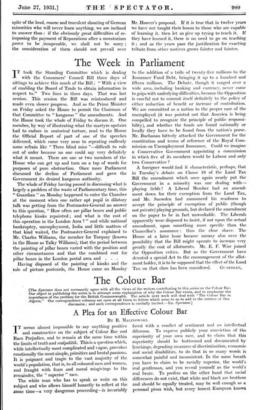The Week in Parliament TT took the Standing Committee which
is dealing -1- with the Consumers' Council Bill three days of sittings to achieve this much of the Bill : " With a view of enabling the Board of Trade to obtain information in respect to." Two lines in three days. That was last session. This session the Bill was reintroduced and made even slower Progress. And so the Prime Minister on Friday asked the House to permit the Chairman of that Committee to " kangaroo " the amendments. And the House took the whole of Friday to discuss it. One member, by way of illustrating what the martyrs upstairs had to endure in oratorical torture, read to the House the Official Report of part of one of the speeches delivered, which came very near to repeating endlessly some refrain like " Three blind mice "—difficult to rule out of order because no one could say very definitely what it meant. There are one or two members of the House who can get up and turn on a tap of words for purposes of pure obstruction. Once more Parliament discussed the decline of Parliament and gave the Government its desired kangaroo authority.
The whole of Friday having passed in discussing what is largely a problem of the waste of Parliamentary time, this " Guardian "' on Monday happened to enter the Chamber at the moment when one rather apt pupil in dilatory talk was getting from the Postmaster-General an answer to this question, " How often are pillar boxes and public telephone kiosks repainted ; and what is the cost of this operation in the London Area ? " and while national bankruptcy, unemployment, India and little matters of that kind waited, the Postmaster-General explained to Mr. Charles Williams, the member for Torquay (known in the House as Talky Williams), that the period between the painting of pillar boxes varied with the position and other circumstances and that the combined cost for pillar boxes in the London postal area and . . .
Having disposed of the painting of kiosks and the sale of picture postcards, the House came on Monday to the addition of a trifle of twenty-five millions to the Insurance Fund Debt, bringing it up to a hundred and fifteen millions. The Debate, though it ranged over a wide area, including banking and currency, never came to grips with underlying difficulties, because the Opposition is careful not to commit itself definitely to the policy of either reduction of benefit or increase of contribution. We are committed as a nation to the proper care of the unemployed (it was pointed out that America is being compelled to recognize the principle of public responsi- bility), and whether the funds are found nationally or locally they have to be found from the nation's purse. Mr. Buchanan bitterly attacked the Government for the constitution and terms of reference of the Royal Com- mission on Unemployment Insurance. Could we imagine a Conservative Government appointing a commission in which five of its members would be Labour and only two Conservative ?
A foreigner would find it characteristic, perhaps, that in Tuesday's debate on Clause 19 of the Land Tax Bill the amendment which once again nearly put the Government in a minority was one dealing with— playing fields ! A Liberal Member had an amend- ment down for their exemption from the Land Taic, and Mr. • Snowden had announced his readiness to accept the principle of exemption of public (though not private) playing grounds, but declared the amendment on the paper to be in fact unworkable. The Liberals apparently were disposed to insist, if not upon the actual amendment, upon something more specific than the Chancellor's assurance : thus the close shave. The House at a later hour became uneasy also over the possibility that the Bill might operate to increase very greatly the cost of allotments. Mr. E. F. Wise joined the Opposition critics. But as the Government have devoted a special Act to the encouragement of the allot- ment holder, it is to be supposed that the effect of the Land Tax on that class has been considered. GUARDIAN,






































 Previous page
Previous page